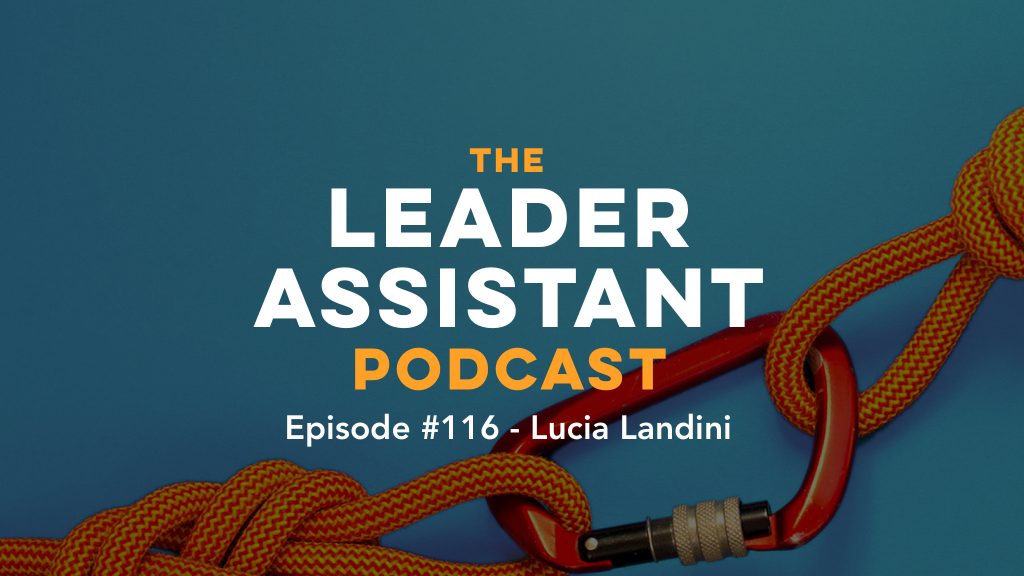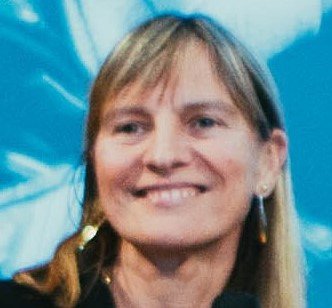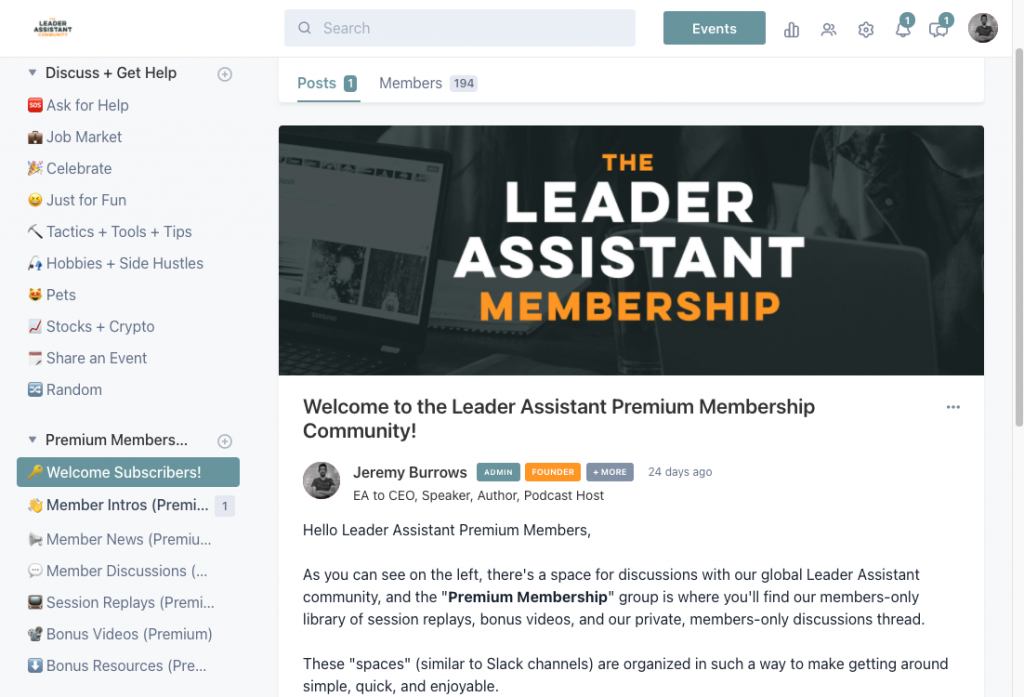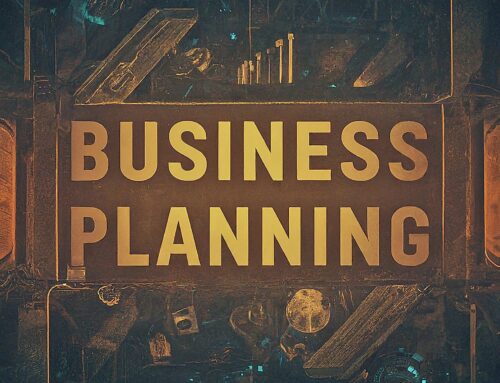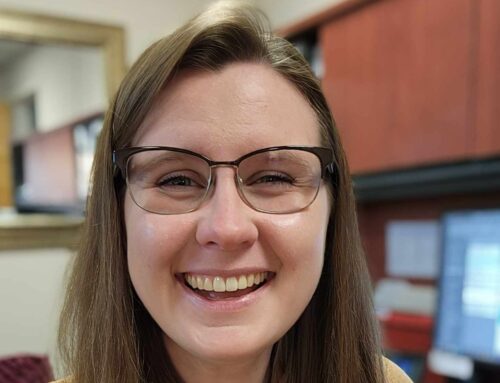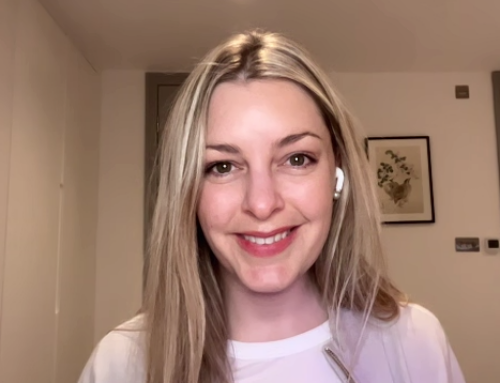Lucia Landini is a longtime senior executive assistant in Italy skilled at working with leaders to achieve shared go als.
In this episode, Lucia and I talk about happiness at work, self-esteem, soft skills, and more!
LEADERSHIP QUOTE
Leadership is about making others better as a result of your presence and making sure that impact lasts in your absence.
– Sheryl Sandberg
CONNECT WITH LUCIA
ABOUT LUCIA
Lucia Landini is a senior Executive Assistant, skilled at working with leaders to achieve shared goals. She is passionate about driving positive change and growth for individuals, teams, and organizations. She is an active mentor and networker. In April 2020, Lucia was named one of the top 50 assistants in Italy by the Italian Magazine, Capital. Her articles are published on Executive Support Magazine and blog.secretary.it. She is a member of the community secretary.it.
THE LEADER ASSISTANT PREMIUM MEMBERSHIP
To learn more about how you can join the now 200+ growth-minded Leader Assistants, check out our Leader Assistant Premium Membership for ongoing training, coaching, and community.
LEADER ASSISTANT LIVE EVENTS
Check out our constantly updated schedule of events for admins and assistants at LeaderAssistantLive.com.
THE LEADER ASSISTANT BOOK
Download the first 3 chapters of The Leader Assistant: Four Pillars of Game-Changing Assistant for FREE here or buy it on Amazon or Audible.
JOIN THE FREE COMMUNITY
Join the Leader Assistant Global Community here, or the Facebook Group here for bonus content and to network with other assistants who are committed to becoming leaders!
SUBSCRIBE
Subscribe to The Leader Assistant Podcast so you don’t miss new episodes!
You can find the show on Apple Podcasts, Spotify, Google Podcasts, Pandora, and Stitcher.
Join my email list here if you want to get an email when a new episode goes live.
LEAVE A REVIEW
If you’re enjoying the podcast, please take 2 minutes to rate and review the show on Apple Podcasts here. Each review helps me stay motivated to keep the show going!
—
EPISODE TRANSCRIPT
Lucia Landini 0:00
Gracias para valence contacto il podcast leader Assistant. Hello, everybody, I am Lucia Landini. And today’s leadership quotes is by Sheryl Sandberg. And the quote is leadership is about making others better as a result of your presence, and making sure that impact lasts in your absence.
Podcast Intro 0:28
The Leader Assistant Podcast exists to encourage and challenge assistants to become confident game changing leader assistants.
Jeremy Burrows 0:37
Why can’t you play
Unknown Speaker 0:37
hide and seek with a mountain? Because it’s always peeking. Hey friends, thanks
Jeremy Burrows 0:45
for tuning in to Episode 116 You can check out the show notes at leaderassistant.com/116. And just before we get into the interview, I wanted to remind you to check out our premium leader assistant membership at leaderassistant.com/membership. We’ve got some awesome members only events and training sessions coming up and some bonus resources in our members only resource library so leaderassistant.com/membership. Hope you can join us and I hope you enjoy this episode. Hey friends, thanks for tuning into The Leader Assistant Podcast. Today I’m speaking with Lucia Landini. And she is the Senior executive assistant at Natixis Italy. Lucia. Did I pronounce it right?
Lucia Landini 1:36
Yes,
Jeremy Burrows 1:37
it is. Right. Awesome. Well, welcome. And we’re excited to chat. Where are you in the world?
Lucia Landini 1:43
I work in Milan, which is in Italy. But I live. I don’t live in the city I live I live near a lake.
Jeremy Burrows 1:55
Awesome. And tell us a little bit about your career as an assistant. How did you end up becoming an assistant? And what do you enjoy that?
Lucia Landini 2:07
Okay. I started my career at Malpensa airport, which is not far from where I live now. And I started working with American Airlines. And, of course, I loved it and everybody loves working in at the airport. And then from American Airlines, I started working with Air France. But I used to work at the airport on shifts. And also I used to teach English and Italian in the evening. So my life was pretty hectic. And I needed a more regular lifestyle. So I wanted to work in an office. So that’s why I started looking for a job in other companies. And I was hired in a company to be the executive assistant to the CEO. It was my first experience. And I loved it. And it was he helped me learn a lot. And then I was the executive assistant to the CEO in another airline, which is really, and so I could put together my love for traveling and for airlines and my passion for working as an executive assistant, which is my job. And also IX expected that working in the office could be a regular job. But it’s not when you’re an executive assistant, there’s no time limit mainly. So you’re always working okay, you control your your time but but there’s there’s a lot to do. But so that’s and then after Italy I five years, almost six years ago, I started working at Natixis and which is an investment bank, and I work in Milan when I’m not working from home. And that’s that’s a completely different environment because it’s more organized and structured. But I love it. It’s suitable for me. And also, I love working there because I I work with smart people and they really inspire me and they helped me become a better person and a better assistant so I like the people I work with first of all. And another aspect I enjoy of my job is that like for every other assistant every day is different or a ad will never get bored. And also, it’s, it’s challenging, it’s challenging, it helps me think out of the box and adapt continuously. So I am in charge of change. And it makes me feel stronger every day. And then the other nice thing is that I live in a small village. And when I go to work, I go, I mean, I go to a big city, so I can go to a museum or an exhibition, or meet new people. So it’s also exciting from a social point of view. And I think it’s average the perfect balance in my life after some time. So I’m really happy.
Jeremy Burrows 5:51
Yeah, that’s great. So what do you think
has been one of the maybe your challenges though, like, so you’re, you’re in a pretty good place now. But what was something that you had to face in your career or your life that really pushed you to the limit, and that you had to work through and overcome.
Lucia Landini 6:15
I had to, to difficult moments, and I had to make a decision pushed by the circumstances. When I was working at the airport, I started working on shifts, which meant leaving my house very early in the morning, or going home getting home late at night, and I was exhausted, and I was afraid I was getting sick somehow. So that was difficult, because I love the job. But it was impossible for me to continue adapting to, to that kind of, to the shift. And so that’s why I decided to work in, in in offices. And another aspect was another difficult moment was the last time I had to change my job. Because the airline I was working with had some difficulties. And I was afraid I could lose my job like other colleagues did. So I just pushed myself to look for something different. And it was really a long effort. And, and I was successful. So it was good.
Jeremy Burrows 7:43
What do you think it was that gave you that confidence? To kind of push through that? And yeah, put yourself out there.
Lucia Landini 7:55
I think confidence for every person confidence has different a different origin. What why my confidence is based on persistence. So when I realize is a situation is difficult for me or is making me suffer, eyes persist looking for something different, I keep working on it, and I never give up. So that’s that’s the confidence I gained in my life, I know that I will continue and continue until good things happen. I know it takes a while. Because first. I mean, you you have to be appointed a few times before you find something which is good for you and for the other people. Yeah.
Jeremy Burrows 8:49
So what if you keep trying and trying and trying and it’s it’s still you’re still not getting what you want? Where do you want to get? How do you know when you need to kind of pivot and change direction?
Lucia Landini 9:08
That’s also something personal. I, I had this experience a few times. I think it happens when you just don’t have any more passion in following a path. And also, I think it’s also when you when you try every option and you’re also running short of time, then it’s time to make a decision. So you can persist and then give up and actually sometimes when I when I tell myself Okay, now we give up and look for something else. That’s when things happen. Yeah, I don’t know why. I mean This is life, I think,
Jeremy Burrows 10:01
no, I think sometimes we try to control things. And when we kind of say, You know what, I guess that’s not what’s meant to be and we give up control. That’s when things kind of are allowed to move.
Lucia Landini 10:16
Yeah, yeah. And that’s, that’s great.
Jeremy Burrows 10:19
Yeah. Well, let’s talk a little bit about
happiness at work. You’re passionate about driving positive change in growth for individuals in particularly assistance. How can assistants listening, really work to enjoy their role? And yeah, just be be happy at work?
Lucia Landini 10:51
Yes, you are, right. I, I love talking about happiness, because assistants. First of all, assistants are very busy everyday, as you know quite well. And we are so busy with other people’s lives that we forget about our life, about our values. And since our job has so many, changes a lot, since it changes a lot, we also make different mistakes every day. So also the mistakes change. And that’s not really encouraging for our self esteem. So I think for For this reason, we really need to, to work on our happiness and improve it because happiness is can improve with little changes. And I have a few that I can tell you, and that I can that I practice every day. So one is, has to do with people, of course, and it is making a social connection. For example, contacting a colleague, or writing to an assistant on LinkedIn, asking for advice, or for a coffee asking to go out for coffee. That’s a way to keep in touch with another person. And it’s very good for us. But it’s something really pleasant for the person who receives our invite. So it’s a way of sharing again of caring about other people. And that makes a difference in a day. Another practice that I have is a random act of kindness. So at work, instead of being busy and centered on our activity, we might offer some help to our colleagues, just the little help or just an email or something to help. It’s it gives a lot to the other person and to us. And then since we are always here, I listen to assistants who speak and say, I don’t have time. So we need to find time for ourselves. And we have time maybe if the lunch break is short, we can go for a short walk and look outside and breathe fresh air. And also savor the moments not only the moment when we are working outside but also the the moments we we live in the office. Like we can step outside the experience and appreciate it. For example, I mean, there’s always a nice moment in the office with our bosses or with colleagues, we are always talking about nice things. So these are moments that we need to consider and appreciate. And I think these little actions help us live a better life. That’s what happens to me.
Jeremy Burrows 14:23
Yeah, and I you know, I can even just tell just from talking with you, the you just really enjoy life and you, you exude positivity. So it’s yeah, just thanks. Thanks for bringing that energy and yeah, just sharing some of your story.
Lucia Landini 14:45
Thank you. I what I think is we don’t have to change our life, to be happy or to feel that we can just make little changes I And for every change is a little effort, of course. But those little changes make a day better. But this may or may experience. Yeah, so it works.
Jeremy Burrows 15:12
Yeah, one of my, my favorite songs, there’s a lyric that says, while I’m alive, I’ll make tiny changes to Earth.
Lucia Landini 15:23
Oh, that’s nice. What song is it?
Jeremy Burrows 15:27
You know, I’m trying to remember what the name of the actual song I think it’s just called tiny changes, honestly changes, I can’t remember. Okay.
Lucia Landini 15:36
We’ll listen to it. Yeah, a tiny change makes a improves a day. And you know, if every day in your week is better, than your week improves, and so on. Yeah.
Jeremy Burrows 15:52
Awesome. Well, let’s, let’s shift gears a little bit and talk about soft skills. You know, you’ve been an assistant for a while. And you know, I’m sure you’ve heard a lot of it either from your colleagues or your executives or just from the world in general of assistants, but heard a lot about automation and artificial intelligence, and how a lot of our tasks that we do as assistants are being automated and replaced. Well, essentially, robots, if you will, computer software is doing a lot more of these days and continuing to do more and more of the repetitive tasks that assistants often have on their job description. So, focusing on soft skills, and developing our soft skills, fine tuning our soft skills is very, very critical, in my opinion, for the future of our profession as assistants. So, what are a couple soft skills that we should really cultivate and develop as assistants, you know, in order to future proof ourselves,
Lucia Landini 17:08
I have two ideas, one is the main ones are listening. So practice active listening. Because when you listen to your boss, or to your colleague or to your manager, you show that you give a value to their job and to their words and to them as persons. And you show that there is a communication going on. And this communication creates trust. And we know that it’s a fundamental element of the relationship boss assistant. So your boss needs to trust you. And he will trust you only if he knows that you care and that you listen to him. And listening means asking questions after listening when he speaks, asking questions after he speaks. Reporting after you complete the actions requires, so it’s listening is a long path. And it’s even more important when we when you are not face to face with our boss. But when we are on the phone, because little changes in the voice, help us understand how a meeting is important how a sentence must be written in a different way, how urgent a trip is. So that’s the main soft skill I think listening and the other soft skill of which you are an expert is leadership. And what they found out is that sistance they think that leadership is something for leaders of the words. So a leader is someone very important and very successful and very rich. While as you showed leadership is a skill you can improve on a daily days. And an assistant has to practice it day by day. And being a leader means means a lot of things but means taking the lead being in a being in charge of time being in charge of your boss says activity and and being informed, prepared, being reliable and optimistic. And, and also being a nice person, I think, because if I had an assistant, I would like my assistant to be to be a nice person.
Jeremy Burrows 20:27
But do you think? Yeah, that would be definitely a requirement. Tell us about a time when you when you’re working with your executives. And you anticipated their needs. So tell is it can you think of an example of a time when you kind of thought 234 Or five steps ahead. And, you know, really set them up well to succeed.
Lucia Landini 21:03
There are a few times. One is I used to work for an executive who traveled to sometimes traveled to Rome to meet clients. And since I realized that these clients were organizing new events in Rome, I prepared an agenda for him, advise them about the people he could meet, gave him advice about traveling, so I prepare an agenda without booking anything without even booking the flights, or, or contacting the clients. So I told him, why don’t you go to Rome, you haven’t been there for a while. So you could meet this person, and this person, and they are doing this. So you might talk about your future plans. And or he also prepared his presentation. So I also gave him the material to take with him. And my agenda was a suggestion for him. And then he told me, he was grateful, because he never thought about it. And actually, he went to so it took my agenda as a as a great advice. So I think it worked. So I think part of an assistant is also looking outside of the office. So looking what’s going on in the world? And what’s going on in in them in the company and in similar companies.
Jeremy Burrows 22:56
Yeah, I think it’s very critical for us to you know, often we are have our heads down. And we’re just working on our to do list and just trying to get our stuff done, because there’s plenty of stuff that needs to get done. And it’s very powerful for us to lift our head up and look around and see what the context of the situation is and see what your actions and decisions that you make and executive make, see how they influence and see the ripple effect across the organization and across the team. And just really anticipate what good or bad things might occur because of certain decisions. So yeah, it’s a great point.
Lucia Landini 23:53
Yeah, I think, and I think it’s something that’s our bosses can’t do because they’re too busy.
Jeremy Burrows 24:03
Yeah. Yep, I agree. Well, lutea really, really thankful for you taking a few minutes to share a little bit about your story. What’s what’s kind of finish on one question, what is one thing that you would tell a new assistant who’s just about to start their first, you know, maybe, you know, executive assistant to a C suite executive role. Next week, what’s one thing that you would tell them and encourage them with?
Lucia Landini 24:37
I would tell them to that that sounds obvious, but it’s true to believe I will tell you believe in yourself. Because if you I mean they need to believe in themselves in in their work. So work hard, believe in what you do and can She knew working and never give up. So and especially something I find very important is be ready to adapt to change. And to start and learn to love change, because that’s what you’re doing. So don’t don’t just concentrate on something, just adapt.
Unknown Speaker 25:29
Great advice.
Jeremy Burrows 25:30
Great advice. Well, actually, I want to I did want to ask you one more thing. So I was wondering if you could say, Thank you for listening to The Leader, Assistant Podcast in Italian. Do you think you could finish this off?
Lucia Landini 25:48
Of course. dropship contacto. podcast, please. The assistant. Love it.
Jeremy Burrows 25:57
Perfect. Thank you.
Lucia Landini 25:59
Thank you, Jeremy. Thank you.
Jeremy Burrows 26:02
And yeah, where can where can people find you and reach out to you to say hi, and find out more about what you’re up to.
Lucia Landini 26:11
You can find me on LinkedIn and on Twitter. And now, and I’ve just started a blog on things that happened to executive assistant, but it’s mainly in Italian, and also on medium. And I will write you the details.
Jeremy Burrows 26:34
Yeah, I’ll put the links in the show notes. Sure. Thank you. But yeah, I appreciate it. And hopefully, one of these days I’ll get to make it out to Italy. I’ve never been I think it would be a fun trip and we’ll have to connect.
Lucia Landini 26:49
Yeah, I’d love to. And Italy is really a wonderful place to visit.
Jeremy Burrows 26:56
Yeah. Awesome. Well,
take care and thanks again for being on the show.
Lucia Landini 27:00
Thank you. Thank you Jeremy.
Podcast Intro 27:11
Please review on Apple podcasts. Goburrows.com

